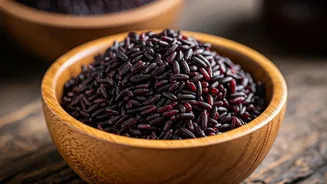Nutrient-Rich Profile
Black rice stands out from other rice varieties due to its impressive nutritional composition. It is a fantastic source of essential nutrients. This includes
dietary fiber, which aids in digestion and promotes a feeling of fullness. Additionally, black rice offers a good dose of iron, crucial for oxygen transport throughout the body, as well as manganese, a mineral that supports bone health and metabolism. The grain also contains notable levels of antioxidants, particularly anthocyanins, which are responsible for its deep purple color and contribute significantly to its health benefits. These anthocyanins work to combat free radicals, potentially reducing the risk of chronic diseases. With its rich blend of nutrients, black rice provides a wholesome base for a nutritious diet, making it a valuable addition to various meals.
Rich in Antioxidants
One of the most remarkable aspects of black rice is its high antioxidant content. Anthocyanins, the compounds that give black rice its dark hue, are potent antioxidants. These substances play a vital role in protecting the body against oxidative stress, a condition caused by an imbalance between free radicals and antioxidants. Oxidative stress is linked to several chronic diseases, including heart disease, diabetes, and certain types of cancer. By consuming black rice, you can provide your body with a shield against these harmful effects. The antioxidants in black rice help neutralize free radicals, thereby reducing the risk of cellular damage and promoting overall health. The abundance of antioxidants makes black rice a powerful ally in the fight against aging and chronic illnesses.
Heart Health Benefits
Black rice may contribute to improved heart health due to its specific components. It can help reduce the levels of harmful cholesterol, such as LDL cholesterol, often associated with an increased risk of heart disease. The fiber content in black rice also plays a key role in maintaining cardiovascular well-being. Fiber helps to regulate cholesterol absorption in the gut, which supports healthy blood flow. Moreover, the antioxidants in black rice, especially anthocyanins, protect blood vessels from damage and promote overall heart health by reducing inflammation and oxidative stress. Regular consumption of black rice, as part of a balanced diet, can be a proactive step towards maintaining a healthy heart and reducing the chances of heart-related ailments.
Glycemic Index Consideration
When considering dietary choices, understanding the glycemic index (GI) is essential, and black rice offers a favorable profile in this regard. The GI measures how quickly a food raises blood sugar levels. Black rice has a relatively low GI, which means it causes a slower and steadier rise in blood sugar compared to high-GI foods. This characteristic is particularly beneficial for people with diabetes or those looking to manage their blood sugar levels. A low GI diet can help improve insulin sensitivity and reduce the risk of type 2 diabetes. The fiber content in black rice also contributes to this slow release of glucose into the bloodstream, helping to prevent sharp spikes in blood sugar. Including black rice in meals can be a smart dietary strategy for individuals aiming to maintain stable energy levels and promote metabolic health.
Digestive Health Support
The high fiber content of black rice makes it a beneficial food for digestive health. Fiber aids in regulating bowel movements, thus preventing constipation and other digestive issues. It also acts as a prebiotic, which means it serves as food for beneficial gut bacteria. A healthy gut microbiome is important for overall health, influencing everything from immunity to mental well-being. By promoting the growth of good bacteria, black rice can improve nutrient absorption and reduce inflammation in the gut. Furthermore, the fiber in black rice helps to create a feeling of fullness, which can be useful in managing weight. Regular intake of black rice supports efficient digestion, a healthy gut microbiome, and overall digestive wellness.
Incorporating Black Rice
Integrating black rice into your diet is simple and versatile, making it easy to enjoy its health benefits. It can be used in numerous ways, from the traditional to the creative. Start by substituting it for white or brown rice in your favorite dishes. Black rice cooks similarly to other rice varieties but has a slightly nutty flavor and a chewier texture. Try adding it to salads for a colorful and nutritious boost, or use it as a base for stir-fries, curries, and rice bowls. It also pairs well with various vegetables, lean proteins, and flavorful sauces. Black rice can even be used in breakfast dishes, like porridge or puddings, to add variety. By experimenting with black rice in your meals, you can enhance both the nutritional value and the enjoyment of your food, supporting a healthy lifestyle in a delicious way.



















